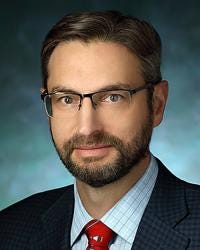By Howard Wolinsky
Eating a balanced diet, as recommended by the U.S. Department of Agriculture (USDA), can help prevent progression of Gleason scores to risky levels of GG 3 or above, according to a newly published study by researchers from Johns Hopkins School of Medicine in Baltimore.
“Take home message: a healthy, high-quality overall dietary pattern may reduce the risk of grade progression, and particularly progression to grade group 3 or higher, for men in Active Surveillance,” senior author Bruce Trock, PhD, professor of urology, epidemiology and oncology at the Johns Hopkins University School of Medicine, and director of the Brady Urological Institute’s epidemiology division, told me.
He added: “A high quality overall diet appears to reduce risk but does not eliminate it, which is one reason why its critical for men in active surveillance to adhere to the follow-up regimen.”
(Bruce Trock, PhD)
The diet study appears in the current edition of JAMA Oncology
Co-author Christian P. Pavlovich, MD, director of the Brady Urological Institute’s prostate cancer Active Surveillance program at Hopkins, said, “We now finally have evidence that a healthy diet is not only good for the heart and for preventing some cancers, but it may actually keep someone with cancer of the prostate in a better shape to fight it/prevent it from getting worse. A big deal, I think.
“This is not a vegetarian, vegan or keto diet but rather a balanced one. Moderation in all things. Sounds boring, but is the right course most of the time.”
(Christian Pavlovich, MD)
[Note: More information about the diet in the following story.)
The Hopkins study confirms and extends the results of a study at MD Anderson Cancer Study published in 2021 by Justin Gregg, MD, of MD Anderson Cancer Center in Houston. Gregg said told me: “Our data plus theirs bolsters the case for healthy eating after diagnosis.”
Pavlovich said his group looked at grade reclassification or upgrading of prostate cancer to Grade Group 2 or higher. The researchers also looked at grade reclassification to Grade Group 3 or higher, known as “extreme grade reclassification,” a more aggressive form of disease.
The Hopkins study included 886 men with Grade Group 1 prostate cancer managed with surveillance, who reported similar dietary intake as men of the general population. “So, this is not necessarily a cohort of extremely healthy men or men eating differently, because of their prostate cancer as far as we can tell,” Trock said.
In the newly published study, the researchers prospectively evaluated the histories of 886 men (median age at diagnosis: 66) diagnosed with low-risk grade group 1 prostate cancer from January 2005 to February 2017, all of whom were in the Johns Hopkins Medicine surveillance program and whom, at the time of enrollment. They also completed a validated food frequency survey — the Block 1998 Food Frequency Questionnaire — regarding their usual dietary patterns.
Of the participants, 803 (90.6%) were white, 28 (3.2%) identified as other races and ethnicities, and 55 were Black (6.2%), .
Based on their responses to the questionnaire, a Healthy Eating Index (HEI) score was calculated for each patient. HEI ranges from 0 to 100.
“The HEI is a validated measure of overall diet quality, quantifying how well an individual’s dietary pattern adheres to the recommendations of the U.S. Department of Agriculture’s Dietary Guidelines for Americans,” said lead author Zhuo Tony Su, M.D., a fifth-year resident at the Brady Urological Institute and the Johns Hopkins University School of Medicine. “We looked at each patient’s HEI score — as calculated from their dietary information recorded at enrollment in our active surveillance program — and assessed whether men with a higher quality diet were less likely to experience grade reclassification in the years afterward.”
Su said the researchers also evaluated the patients using an energy-adjusted HEI (E-HEI) score that takes into account a person’s daily caloric intake.
Pavlovich said, “In terms of the HEI and the E-HEI, both were inversely associated with grade reclassification, particularly to Grade Group 3 or worse disease, and these were statistically significant correlations between eating a healthy diet and having your cancer not get worse.” The higher the HEI and E-HEI scores, the more reduced the risk that a low grade prostate cancer had progressed to a higher grade disease that mandated curative treatment.
In terms of outcomes, at a median follow-up about 6 1/2 years, 21 percent of men reclassified to Grade Group 2 or higher, of which about 6 percent reclassified to Grade Group 3 or higher And by 10 years, one-third of men had reclassified to Grade Group 2 or higher, of which 10 percent have reclassified to Grade Group 3 or worse.
While 2% of men died during this interval, importantly, none died from prostate cancer, indicating the safety of surveillance over this time interval.
“Our results do merit validation in prospective studies and in more diverse populations. But, again, for the first time, we can tell someone with a straight face and with high-evidence data that eating right can delay prostate cancer progression,” Pavlovich said.
The pioneering Hopkins’ surveillance program was initiated in 1995 as a prospective cohort of men diagnosed with low-grade prostate cancer and managed with a surveillance intent. Since about 2005, men prospectively completed a validated questionnaire about their usual dietary patterns at enrollment into surveillance.
Inclusion for this new study was dates of 2005 to 2017 of men who completed the questionaire and men with low-grade disease verified by a confirmatory biopsy.
The Healthy Eating Index was calculated in line with USDA/government issued advice on a healthy diet for Americans. Pavlovich said this is a diet rich in vegetables, fruits, protein foods (including beans and nuts), whole grains, low- or non-fat dairy foods, and unsaturated vegetable oils, and that limits saturated fat, sodium, and added sugars.
He points his patients to Dietary Guidelines for Americans, 2020-2025 and Online Materials: https://www.dietaryguidelines.gov/resources/2020-2025-dietary-guidelines-online-materials (See story below about what constitutes a healthy diet.)
The Hopkins study in part confirms and in part extends research in 2021 by Justin Gregg, MD, of MD Anderson Cancer Center, showing how a healthy diet can benefit surveillance patients.”
Pavlovich said: ““Ours could be considered that confirmatory research. Both some of Gregg’s and our studies point to a beneficial effect, but because ours was much larger (more than twice as many men), started earlier, and thus had longer follow-up (more than twice as long), the association passed the test of significance p<0.05 with flying colors. In fact, we show that the association between healthy eating and grade reclassification is even stronger when we look for extreme upgrading events (GG3 or higher)!
“It’s indeed always been a good idea to promote healthy eating. Now we can more definitively say that it’s associated with beneficial outcomes in terms of cancer progression.”
What’s next? Trock said, “We’re looking at the ways in which the role of HEI may be affected by factors such as age, physical activity, smoking, NSAIDS.
What’s a balanced diet anyway?
By Howard Wolinsky
We hear a lot about vegan and vegetarian and Mediterranean diets these days in connection with potentially preventing and slowing prostate cancer.
But the new Johns Hopkins study takes a different approach to what constitutes a balanced and healthy diet.
Researchers use the the Healthy Eating Index (HEI) calculated in line with U.S. Department of Agriculture-issued advice on a healthy diet for Americans. The food pyramid is a forerunner of the HEI.
Christian Pavlovich, MD, head of the Active Surveillance program at Johns Hopkins, said in an interview this diet is rich in vegetables, fruits, protein foods (including beans and nuts), whole grains, low- or non-fat dairy foods, and unsaturated vegetable oils, and that limits saturated fat, sodium, and added sugars.
He points his patients to Dietary Guidelines for Americans, 2020-2025 and Online Materials: https://www.dietaryguidelines.gov/resources/2020-2025-dietary-guidelines-online-materials
Hopkins epidemiologist Bruce Trock, PhD, told me currently only about 60% of American men aged 60+ have a diet considered healthy according to Dietary Guidelines for Americans, on which the HEI is based.
He said a high quality diet includes several servings per day of each of the following healthy food categories (specific foods listed are just examples):
Vegetables
Fruits
whole grains (whole grain/multigrain breads or pastas, cooked cereal like oatmeal, brown rice, farro, quinoa, plain popcorn)
healthy proteins (lean meats, chicken, beans, legumes, nuts, eggs, soy foods)
low fat or fat-free milk, yogurt or cheese
monounsaturated and polyunsaturated fats (olive oil, avocado,, fatty fish, sunflower oil, safflower oil, canola oil)
And limit intake of the following:
Saturated fats (fatty red meat, full fat milk, butter, fried foods)
Added sugars (soda, sugary drinks, sugary cereals, baked goods)
Sodium (table salt, canned soups, processed foods)
Alcohol
Trock said, “This may take a little effort, for example paying attention to nutrition labels on foods, considering your total calorie intake and your level of physical activity As a reference, a moderately active 60+ year old 175 pound man needs about 2400 calories per day, with total calories increasing with activity level.”
(More info on types of foods and amounts can be found here www.myplate.gov/)
ProtecT researchers to speak Oct. 26 to ASPI
By Howard Wolinsky
Active Surveillance Patients International (ASPI) is hosting a webinar at noon EST, Saturday Oct. 26, featuring Drs. Freddie Hamdy of Oxford University, and Jenny Donovan of the University of Bristol in England, who led the famed Protect Trial in the United Kingdom that showed that Active Surveillance (they call it Active Management) is as safe and effective as radical surgery and radiation therapy.
REGISTER HERE: https://zoom.us/meeting/register/tJclduCoqjIqHd0sFUmKUi1jduD28vcbvhm6
(Dr. Freddie Hamdy and Dr. Jenny Donovan.)
ASPI recently gave its “special” award to recognize the researchers, their team, and the 1,634 patients who made this study possible over the past 25 years.
By Howard Wolinsky
Brian Helfand, MD, PhD, chief of urology at NorthShore University HealthSystem outside Chicago, is an expert not only in prostate cancer but also in molecular biology, the scientific discipline used to develop tests for prostate cancer.
He is the first announced speaker on the panel of “AS25” (Active Surveillance ‘25), the first event sponsored by TheActiveSurveillor.com Substack newsletter.
(Note: Helfand has been my urologist for the past eight years.)
This webinar is a thank you program for paid subscribers.
AS25 will be held at noon, Saturday, January 4, 2025.
The event is free to paid subscribers and founding subscribers.







Mike Little is an AS patient from battleground Michigan. I wrote recently about how a few readers felt I was taking sides between Harris and Trump just because I mentioned that Harris was wore a Prostate Cancer Awareess ribbon September and how in October she announced a program to help Black men with higher risks for prostate cancer. I urged ex-Prez Trump get onboard with these ideas.
Here's what Mike had to say:
Howard, you are not making this a political issue. Yes, l am a Harris supporter and black. The fact that someone, regardless of their political beliefs is trying to make you aware of information that will allow you to make informed decisions about your health isn't political to me. I don't care if it's Trump, Biden, Harris, Bush or whoever is willing to help create awareness of this issue is what's important to me. Thanks for all you do. You do a great job and have been very helpful to me with my prostate cancer journey.
Mike Little
Thanks, David.
When I was diagnosed, I asked about diet.
There was NO guidance then.
Glad to see some movement.
Howard